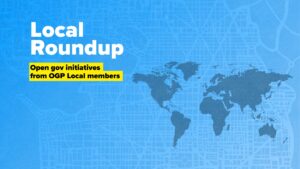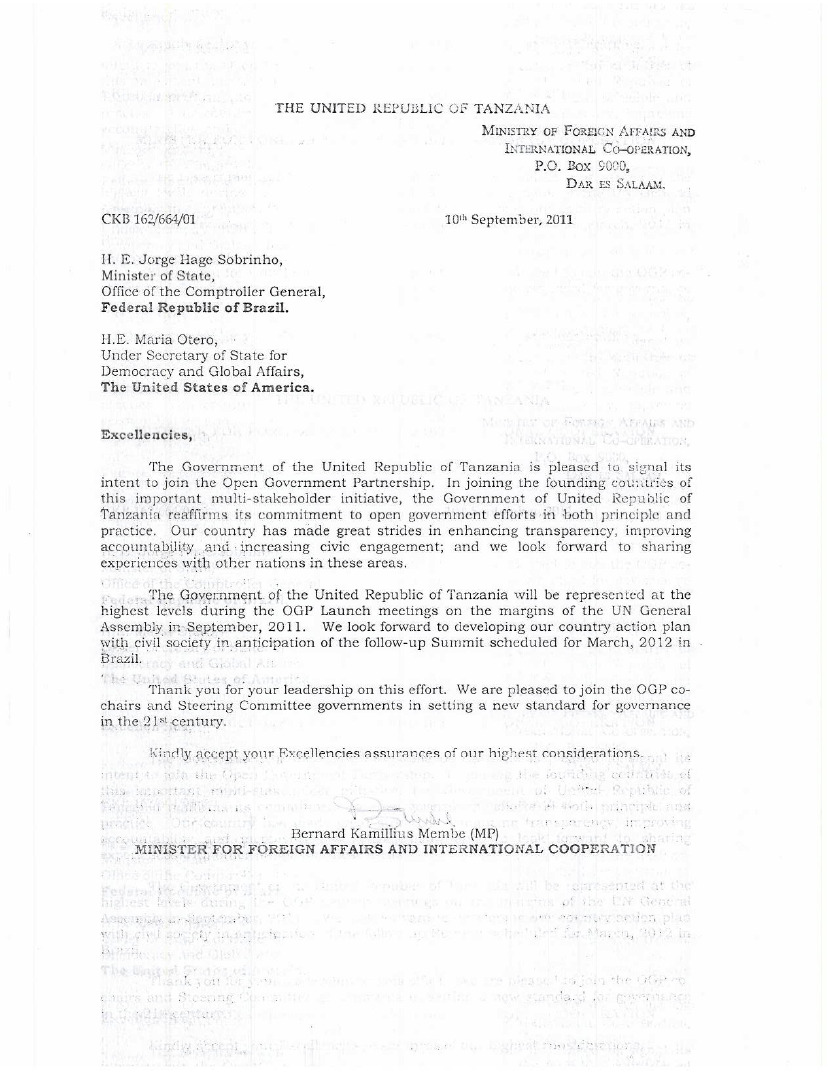The OGP Steering Committee recognizes the participation of the Municipality of Kigoma Ujiji in the OGP Local program (formerly known as OGP Subnational Pilot). As part of the program, OGP will continue to provide technical support to the Municipality and the civil society partners to achieve their local open government goals.
The following text was contributed by the Government of Tanzania.
- Tanzania joined the Open Government Partnership Initiative in September 2011. The intention is to make the Government business more open to its citizens hence improve public service delivery, government responsiveness, combating corruption and building greater trust.
As stipulated under the Tanzania OGP Action Plan of 2012/2013, the OGP commitments are focused on the four pillars namely transparency, accountability, citizen’s participation and technology and innovation. Our main focus is in the Health, Education and Water sectors.
On transparency, the commitment is to improve various government websites to enable citizens to access information freely and timely. A citizens Budget in simplified language has been produced. The aim is to make citizens aware of the national budget components.
Participation of Citizens in decision making processes and policy formulation has been enhanced. A platform to provide feedback on government services through the http://www.wananchi.go.tz website is in place.
Client Service Charters in the Education, Health and Water sectors have been updated. The National Audit Office website http://nao.go.tz has been improved and legislative amendments on asset disclosure by public leaders is in the final stage of enactment. The aim is to strengthen accountability and integrity.
Furthermore, in improving transparency, citizen participation, accountability and integrity, the Government is finalizing the Water Point Mapping System for monitoring rural water supply services (https://wpm.maji.go.tz): Establishing a How Do I? Nifanyeje? Website, (http://www.egov.go.tz/howdoi) which provides information on how to acquire various public services and conducting an open data assessment to establish an Open Data website (http://www.data.go.tz).
Tanzania’s Letter of Intent to Join OGP:
- The Ministry of Foreign Affairs and International Co-operation of the United Republic of Tanzania presents its compliments to the Embassy of the United States of America and with reference to the Embassy’s Note No. 621 / 11, dated 2nd September, 2011, has the honor to attach a Letter of Intent to join the Open Government Partnership initiative from Bernard K. Membe (MP), Minister for Foreign Affairs and International Cooperation for onward transmition.
The Ministry of Foreign Affairs and International Co-operation of the United Republic of Tanzania avails itself of this opportunity to renew to the Embassy of the Unites States of America the assurances of its highest consideration
Commitments
- Dashboard of OGP Progress (2012)
- Water Data and Mapping (2012)
- Citizens’ Website (2012)
- National Audit Office Website (2012)
- Client Service Charters (2012)
- Participation by Email and Mobile Phones (2012)
- Reporting on Medical Supply Orders (2012)
- Access to Health, Education, and Water Data (2012)
- Government Websites (2012)
- Open Forum on OGP Commitments (2012)
- Complaints Register (2012)
- Citizens’ “How Do I?” Website (2012)
Explore the feasibility of establishing a “Nifanyeje,” a website where citizens can get practical information of how to go about getting Government services (e.g. getting a scholarship for university, water or electricity services, drivers license, business license, passport and other services) and what to do if they are unable to secure the service in the required time.
- Local Government Service Boards and Committees (2012)
- Citizens’ Budget Document (2012)
- Contact Point for OGP Communication (2012)
- Global Practice on Data Disclosure (2012)
Study global good practice on data disclosure for establishment of http://www.data.go.tz website that reflects high global standards to contain a substantial number of Government held data sets.
- Donor Funding (2012)
Encourage donors to exercise greater transparency of donor funding given to Tanzania (Government, Civil Society, and Private Sector) consistent with International Aid Transparency Initiative principles. Likewise, Government, Civil Society and Private Sectors should post online revenues and expenditures, in machine readable format on an annual basis.
- Open Government Innovation by Local Entrepreneurs (2012)
- Disclosure of Public Officials’ Assets (2012)
- Allocation of Grants to Local Governments (2012)
- Budget Execution Reports (2012)
- Local Government Transparency (2012)
- Reports on Tax Exemptions (2012)
- Best Practices for Freedom of Information Laws (2012)
- Parastatal Organisations (2012)
- To Enact a Freedom of Information Act by December 2014. (2014)
The legislation will be established in line with international best practice and shall include:-
(i) Recognition of a human right to information, along with a broad presumption of openness of information held by public bodies, including state-owned enterprises and bodies, and private bodies undertaking public functions or operating under public funding;
(ii) An obligation to publish a wide range of information on a proactive basis;
(iii) Robust procedures for making and processing requests which are simple, free and quick (with a clearly specified maximum response time).
(iv) A limited regime of exceptions based on preventing harm to protected and security related interests, a public interest override and severability where part of a record is exempt;
(v) A right of appeal.
(vi) Protection for good faith disclosures and sanctions for obstruction of access; and
(vii) Obligations to report on requests received backed up by sanctions for refusal to disclose information without reasonable cause. - To Establish an Open Data System by December 2016. (2014)
Key steps to operationalizing this commitment include the following:
(i) Establishing a coordinating body or working group under the Ministry of Finance for exploration of this issue.
(ii) Supporting guidelines issued, followed by legislative resolutions demonstrating support for transparent operations and the integration of open data into policy considerations, including provision of data in machine readable formats.
(iii) Establishment of a user-friendly, interactive open data portal data.go.tz.
(iv) Publication of key datasets on data.go.tz, particularly related to the education, health and water sectors, including data from Basic Education Statistics in Tanzania (BEST) and national examinations (NECTA), medical facilities and Medical Stores Department (MSD), water points, company registrations, NBS census and survey data and GIS data on village and ward boundaries; and with all data an emphasis on provision of disaggregated data at the facility level so as to be meaningful to citizens. - To Make Budget Data (Eight Key Budget Reports), Audit Committee Reports and Tax Exemptions Publicly Available by December 2014. (2014)
In line with internationally accepted good practices for open budgets, this includes:
(i) Publish, in a timely manner, the following eight key budget reports each budget year: a pre-budget statement; the executive’s budget proposal; the enacted budget; a citizens budget; in-year reports on revenues collected, expenditures made and debt incurred; a mid-year review; a year-end report; and audit reports.
(ii) Publish the reports of the Parliamentary Audit Committees.
(iii) Publish all tax exemptions, on a monthly basis.
(iv) Publish Budget data online, in machine-readable formats, as well as key information made available at district councils as far as possible at all education and health facilities. - Make Land Use Plan, Ownership and Demarcated Areas for Large Scale Land Deals Accessible Online for Public Use by June 2016. (2014)
- Tanzania to Fulfill Its EITI Commitments by June 2016 (2014)
Related Content

Why Europe’s defence policy must battle disinformation
Europe is strengthening its collective defence in response to escalating disinformation, sabotage, and cyberattacks. But military measures alone are insufficient. Our strongest defence lies in resilient democracies. Traditional warfare evokes imagery of trenches and air raids. But Europe’s contemporary reality…

Five Feminist Lessons from a Super-Election Year
Five action research projects funded by the International Development Research Centre’s (IDRC) Feminist Open Government Initiative show that progress in gender and inclusion is possible when local coalitions have the right tools and allies, explore key lessons.

Local Roundup | June 2025
Featured: SMC Climate Participatory climate action is gaining ground—through citizen assemblies, co-created climate action plans, and digital tools for public oversight. Discover some of the experiences shared by Buenos Aires (Argentina), Yerevan (Armenia), Sekondi-Takoradi (Ghana), Austin, TX (USA) and Democracia…
Czech Republic 2022–2024 Results Report – For Public Comment
In 2025, the Independent Reporting Mechanism (IRM) published the Results Report for the Czech Republic's sixth OGP action plan. The report reviews the level of completion and early open government results for commitments in the action plan. In the Czech…

